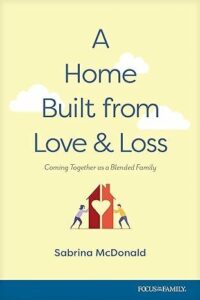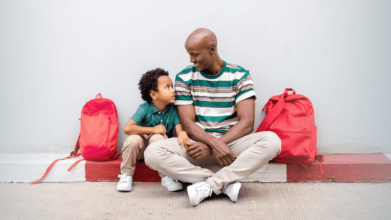John Fuller: Today on Focus on the Family with Jim Daly, we’ll explore the unique challenges and joys that couples experience in a remarriage and stepfamily situation.
Sabrina McDonald: Our wedding, of course, we were really looking forward to it and excited about saying goodbye to our single days and, you know, moving forward and happy, and, um, I remember walking in the door. The door’s open to the sanctuary, and of course, I’m expecting … you know, I did this 10 years earlier with someone else. It was a, you know, beautiful day, wonderful celebration.
John: Joyful, yeah.
Sabrina: Yeah, joyful, people smiling, and I walk in the door, and immediately, I’m greeted with sniffles and sadness and, you know, you can hear people ruffling their, their tissue and crying and, you know, sniffing, and looking over at different places, you see shoulders shaking. I mean, you’re not just talking about just a polite cry, you know (laughs). You’re talking about really, really weeping.
John: Sabrina McDonald joined us last time to describe her own journey through remarriage and stepfamily and she’s back with us again today. Your host is Focus president and author Jim Daly, and I’m John Fuller.
Jim Daly: John, we had such a tender and thoughtful conversation last time with Sabrina exploring how blended families often don’t blend very well, and we do touch on this subject from time to time, because there are a lot of people, for all kinds of reasons, that end up in a blended family. It could be the death of a spouse, the death of both spouses, divorce, whatever it might be. And, you know, at Focus, we feel we need to help equip families where they’re at, so as they move forward, they could do the best job they can do in the Lord, uh, to be the family they want to be. And we’re going to come back to this conversation today.
If you missed it, uh, last time, uh, get the download. You can go to the website, or even better, get our, uh, smartphone app and you can have the whole library of Focus programs there for you. Um, Sabrina shared how remarried couples have to navigate life and reconnect, and there was so many brilliant things said yesterday, John, that I, again, I would just encourage you to get ahold of that. And how can we do that, John? How do people do that?
John: Well, the best way is to stop by focusonthefamily.com/broadcast. And we mentioned last time that Sabrina has captured her story and, uh, her insights, her perspectives, for remarried couples and their families in a terrific book. It’s called A Home Built from Love and Loss: Coming Together as a Blended Family, and we’ve got details on the website, or call 800, the letter A, and the word FAMILY.
Jim: Sabrina, welcome back.
Sabrina: Oh, thank you for having me.
Jim: It’s so good, and I so appreciate your vulnerability in all this last time. I mean, both of us were getting choked up with, uh, the back and forth about blended families. You were the parent in this blended family, I was the child, so, uh, kind of different perspectives, but, you know, pain and joy in both ways, um. You offer so much practical help for these couples that are in a remarriage. Uh, you urge them to express their feelings and even talk about their previous marriage, uh, with each other. Why, why is that important? ‘Cause I could, I could see that as being also dangerous.
Sabrina: Yeah. Um, there’s definitely some danger in it, and I think we all understand the danger. You know, there’s jealousy, there’s pain, uh, there’s fear that comes along with it.
Jim: Mm-hmm.
Sabrina: But I don’t think that most people understand that there’s benefit, and the benefit comes when you understand that your previous spouse made you a part of who you are. They are intricately involved in your personality and who you’ve become, and you can’t really understand your new spouse until you understand their previous spouse, because they’re part of them.
Jim: Huh.
Sabrina: So when you talk about that person, you begin to understand why maybe they interpret things the way that they do, um, the previous ways of communication, love languages, um, all of these kinds of things.
Jim: Well, that’s true, all different. Think of that, you’re married to a certain temperament the first marriage-
Sabrina: Exactly.
Jim: … and you understand their love language perhaps, just to use that code.
Sabrina: Mm-hmm.
Jim: And then you marry someone else who’s different and, uh, you have to relearn the way they want to be loved, or need to be loved.
Sabrina: Exactly. And, and the way that their previous spouse loved them is going to be different than the way you naturally love. And so, for example, my first husband’s love language was physical touch, and he loved his back to be scratched and to be rubbed on, and so when I married Robbie, I thought, “Well, obviously, this is the way I’ve learned to love my spouse.” So I would scratch his back and rub on him, and he would just recoil from that and pull away from me, which really hurt my feelings and I couldn’t figure out why is he, you know, rejecting the love that I’m giving to him? And it turned out that that wasn’t his love language. Of course, he had his own love languages. But even that changed as we were married because I gave him more affection, um, in, you know, different ways, holding his hand, rubbing his back.
Jim: Yeah, more of that physical touch.
Sabrina: Yeah, more of those physical touch aspects, and he really craved that from his first wife, but when it came to me, I was overloading him with it.
Jim: Interesting.
Sabrina: So now his love language has changed to quality time or words of affirmation, so that, in and of itself, changed.
Jim: Yeah.
Sabrina: But by knowing her as his previous spouse and un- understanding how they interacted with one another, I’m more able to understand who he is.
Jim: Even that creates a little bit of stress, obviously, ’cause you’re in a groove and then you’re disrupted in that groove, right-
Sabrina: Yeah.
Jim: … as, as to how you have learned to express love, um, and then you got to learn a new way.
Sabrina: Oh, yeah.
Jim: I mean, that’s part of it, but, you know, also if you see that as more playful and an opportunity-
Sabrina: Mm-hmm.
Jim: … it, it’s so much better than frustration and angst, right?
Sabrina: Yeah.
Jim: How come you don’t respond? And I, I mean, that can go in a negative direction when it doesn’t need to.
Sabrina: Yeah.
Jim: I mean, it’s just what it is. Let me, let me move to the children. Um, (laughs) you know, again, I mentioned earlier, uh, you lost your spouse, remarried Robbie, who had lost a spou- … I was child out of divorce.
Sabrina: Mm-hmm.
Jim: You know, my mom and dad divorced. But kids can be kind of an area of stress and, man, did I feel that with Hank, my stepdad. He just, you know, almost every day, he was able to communicate to me, “I really wish you weren’t around,” to which the good thing is I didn’t care.
Sabrina: Yeah.
Jim: It didn’t really affect me emotionally, (laughing) ’cause I was like, “Whatever.”
Sabrina: Mm-hmm.
Jim: I was already getting that teen attitude at nine years old.
Sabrina: The feeling’s mutual, yeah (laughs).
Jim: Yeah. You know, it didn’t dent me emotionally.
Sabrina: Mm-hmm.
Jim: It didn’t take away my sense of worth or value, and I know, some people, that does happen. I would just pray for those children to have a little more resiliency and not let people dictate who you are and your identity in Christ, right?
Sabrina: Yes, exactly.
Jim: But, um, in that respect, though, children can become a stressor in the relationship, and how do you manage and navigate that to where, you know, you lay your head down on the pillow at night and, you know, all of a sudden, it’s, you know, Johnny did this and Mary did that and who’s going to talk to them and how do we straighten this mess out?
Sabrina: Yeah. Well, it’s very difficult to navigate. I mean, I think that’s, you know, (laughs) part of the, the problem with blended families. In traditional families, you have a man and woman that get married and they have a honeymoon period, and even if they get pregnant on their honeymoon night, they’ve got nine months to work it out before they have kids. And, when you get married in a blended family, you don’t have that.
Jim: Mm-hmm.
Sabrina: Immediately, you have a family full of interactive relationships and it’s just, uh, it’s like a spiderweb. If you start drawing lines … you know, in a traditional family, you have a very clear map. You know, you draw a line to mom and dad, kids come out of that. And then … but when you have a blended family, you have grandparents, you have children, you have … some of those children are in their teenage years. Um, some of those kids are, are struggling with the grief from the previous tragic situation, whatever it may be, and you just have all these personalities. You know, you, you look at these TV show like a Survivor or something where they put all these people on an island and then they (laughing), you try to get them all to survive, you know, together, and the chaos that happens, and this person hates this person, and this person’s stabbing this person in the back, but we take them in a blended family and we’re essentially doing the same thing. We’re taking a whole group of strangers and putting them in a home and saying, “Okay, live now and all get along and everybody like each other,” and it’s just not possible to do that.
Jim: Yeah.
Sabrina: And how do you navigate that? Well, you, you have a lot of grace and, you know, I wrote this book so people will understand that there is grief that is happening. It’s not just, “I don’t like you.” There’s also, “I don’t like you because you’re trying to be my dad,” “I don’t like you because you think you’re my mom, and you’re not my mom,” and there’s that conflict that, um, loyalty that goes on and you’re feeling pulled between …So let’s say you do like your stepmom and your mom is still alive, or maybe your mom is deceased, but you still feel love toward that person and now you’re, you’re sad. You feel like you’re hurting the one that you love by wanting to like this person, so that creates a problem and … or let’s say you really don’t like this person, your personalities just don’t get along, but yet you had no choice in the matter.
Jim: Yeah.
Sabrina: Your parent loves them and wants to be married to them. They didn’t marry you, they married your parent, you know. So how do you deal with that? Well, that, that is the question. It’s a dance. I mean-
Jim: Well, and you had that situation with Benjamin, I think-
Sabrina: Oh, yes.
Jim: … your son, uh, when he was young and, and you had to kind of talk with him about who mommy loves and how mommy loves. How did that … I read that. I, I, I want to hear your answer, then I’m going to push back on you a little bit, (laughing) so go ahead.
Sabrina: Well, when Ben … he was five, we had just gotten married, and he was really unhappy with Robbie. You know, Robbie’s coming in. He’s taking over.
Jim: And he’s how old?
Sabrina: Benjamin was five and just in kindergarten, so his whole-
Jim: But running the show and now he’s not (laughs).
Sabrina: … his whole life is changing. Yeah, so he’s going into school and he’s also … has a new man in his life who’s taken over his mom. And, uh, so here comes this man telling him what to do, and he was very angry at me, you know, and finally, he looked at me, he stomped his little feet, he said, “Do you love him more than you love me?” Of course, he’s-
Jim: Here’s a moment a truth right here.
Sabrina: Yeah. He’s five, you know.
Jim: Yeah.
Sabrina: And I’m looking at his big brown eyes with just pain behind his, his eyes, and I looked at him and I thought, “How can I explain to him how this situation is happening?” And, finally, I said, “Are you going to be here when I’m old?” and he goes, “What?” I said, “You’re going to grow up, right?” “Yeah. Yeah, I’m going to grow up.” And I said, “You’re going to get married one day, right?” “Yeah, I’m going to get married one day.” And I said, “Then you’re going to move off and you’re not going to be here anymore, but Robbie will be here. He’ll be here when I’m old. He’ll be here taking care of me. When you’re off with your family, he’s going to be here with me. So I do love him, I do love him.” And, um, he understood that. It was like he, he kind of … it put it into focus for him a little bit.
Jim: No, that’s good. The mother knows her son.
Sabrina: Yeah (laughs).
Jim: For me, it was, you know, what I probably would have wanted to hear is, “Of course, I love you-”
Sabrina: Oh, yeah. Well-
Jim: “… but, you know-”
Sabrina: Yeah.
Jim: “… my love for Robbie is different.”
Sabrina: Mm-hmm.
Jim: “… and we’re going to be together forever and you’re …”
Sabrina: Mm-hmm.
Jim: I like that, but there was something when, when I first read that, I was like, “Oh, but tell me you love me (laughing).”
Sabrina: Well, we have, we’ve had that conversation many, many times, you know-
Jim: I’m sure you did.
Sabrina: … in, in telling him that I love him and that I know this is hard for him and it’s a new life and-
Jim: Uh, let’s speak to the issue of respect in the stepfamily. I mean, we’ve, last time and this time, we talked about that, and my stepdad, uh, of course, had none of that from the kids. And I, I don’t know, there’s probably blame on both sides of that equation. The stepchildren don’t treat the stepparent with respect-
Sabrina: Mm-hmm.
Jim: … and then the stepparent is attempting to create that bond-
Sabrina: Right.
Jim: … and then the kids are sniffing that out, going, “Ah, that’s all fake.”
Sabrina: Mm-hmm.
Jim: You know, you can tell I’m an experienced step- stepchild.
Sabrina: Mm-hmm. Mm-hmm.
Jim: But that’s, that’s the dance, and I don’t know, in that equation or that formula, in my case, what Hank could’ve done to, to connect with us. There’s probably many things I would’ve responded to. But speak to that idea generally about how a family, a blended family, a stepfamily, can develop respect within the group-
Sabrina: Right.
Jim: … within the tribe.
Sabrina: Yeah. Well, you know, as a stepparent, I think, so often wants to be loved. Um, they want to come into a family and step into a role that is loved, and that is just impossible. You can do that … your biological children, when they’re born, they, you know, they grow up and they love you, because they’re your biological children.
Jim: It is what it is (laughs).
Sabrina: That’s exactly right. They don’t really choose it. They don’t … it just happens. Um, but with stepchildren, they can’t love you. And that was another thing I had to learn was that, also, a stepparent can’t love a child. It’s not there automatically. It’s something that grows. So I expected Robbie to walk right in and love my children.
Jim: Right.
Sabrina: Uh, they were so young. He didn’t love my children because they weren’t his children. He had to grow in love with my children.
Jim: But it’s really critical for that stepparent to realize that they have to ease into that-
Sabrina: Mm-hmm.
Jim: … that loving relationship-
Sabrina: That’s right.
Jim: … because it’s not a license to be abusive.
Sabrina: That’s exactly right.
Jim: And I, I mean even subtly-
Sabrina: That’s exactly right.
Jim: … I mean, just whatever it might be-
Sabrina: Yeah.
Jim: … a little ignoring of the child or-
Sabrina: Mm-hmm.
Jim: … “Get your act together. You’re always spastic,” or whatever (laughing) you might say, right?
Sabrina: Right.
Jim: ‘Cause you’re not used to that child’s-
Sabrina: Yes.
Jim: … um, you know, personality.
Sabrina: And that’s what we were talking yesterday about, um, you know, when I wanted Robbie to come in and be this disciplinarian in the home. The kids did not respond well to that.
Jim: Yeah.
Sabrina: And so what he really needed to do was focus on that relationship of being a friend, of being someone that they enjoy being around, really letting that be the kind of focus in the home for the stepparent than it is, you know, “Here’s the rules. Here’s the order. You know, respect me.” Um, that, you know, hard line, um, should not be what they really focus on. They really need to focus on that loving, tender getting to know each other.
Jim: Right.
Sabrina: I mean, you’re total strangers at that point.
Jim: Thi- this can feel thankless in the role of stepparent-
Sabrina: Mm-hmm.
Jim: … but you use, uh, Galatians 1:10-
Sabrina: Mm-hmm.
Jim: … as a Scriptural reminder. How does that connect? What is that Scripture?
Sabrina: Yeah, Galatians 1:10. It says, “For am I now seeking the approval of man or of God? Or am I trying to please man? If I were still trying to please man, I would not be a servant of Christ.” So, you know, that’s what it goes back to is, is pleasing God and not pleasing man. You can’t worry about what your stepkids think about you. You can’t worry about what, what your spouse thinks about you. Um, you can’t act in a way that you think is going to get you something in return, even if that acting is love, but you have to do things that you know that God has called you to do and act in a way that you know that the Lord will be pleased instead of mending the family.
Jim: But, but it’s critical, especially in Christ, as Christians, that love is coming from that stepparent to that child.
Sabrina: Oh, yes. I mean, that, that’s the key. That’s the key.
Jim: I mean, you are the adult in the relationship (laughs)-
Sabrina: Yes, absolutely.
Jim: … even if children are spinning out emotionally ’cause they’ve had a lot of loss-
Sabrina: Yes.
Jim: … you got to remember, be the mature one-
Sabrina: Yes.
Jim: … take the blows, and then love.
Sabrina: Yes, absolutely.
Jim: And then you’re going to earn that relationship, I think.
Sabrina: Yeah. Well, and not always, to be honest. I mean, there are, there are people who, no matter how loving you are, no matter how kind you are, no matter how good you are to them, um, they are never going to want to be all in in the relationship and that’s … whatever the reason. Sometimes it’s because they are afraid that their other parent will get hurt or there’s a loyalty issue there or maybe they just don’t like you (laughing). Maybe they just don’t like your personality.
Jim: That’s a hard truth.
Sabrina: It, it’s … but it’s reality, you know. I mean, you step into a, a situation where, especially when the kids are a little older and they’ve got their own personalities, their own dreams-
Jim: Oh, yeah.
Sabrina: … their own hopes, and they just, they’re not … it doesn’t … you can be the most loving person on the planet, you can do everything they want, treat them every way, any way they want, they’re going to find something that they don’t like about you and you just have to accept it for the way that it is.
John: Mm-hmm. Yeah, the realities of stepfamilies, that’s what we’re talking today about, uh, on Focus on the Family with Jim Daly. Our guest is Sabrina McDonald and, uh, she’s written a terrific book, A Home Built from Love and Loss. And you can find out more about that book and, uh, resources for you at our website, and that’s focusonthefamily.com/broadcast.
Jim: Sabrina, I’m going to put you on the spot. You wrote it in the book, so (laughs) I’m not, I’m not being mean (laughing), but your greatest, uh, failure as a stepmom when you were reflect back on Robbie’s children-
Sabrina: Mm-hmm.
Jim: … who were older-
Sabrina: Mm-hmm.
Jim: … when you got married to Robbie. What were, uh, you know, an example of where you thought, “Ah, if I could just redo that, I would’ve done it differently?”
Sabrina: Yeah. Uh, well, uh, there are many of those examples (laughing)-
Jim: Well, I appreciate that.
Sabrina: … but, uh, (laughs) but the one that I wrote about in the book was, um, when we first got married, um, Robbie and his son Seth, who was just a teenager at the time, he, they would go out every Saturday and go golfing.
Jim: Yay! Oh, sorry.
Sabrina: Yeah (laughing). That’s what they thought, “Yay!” And I’m at home and, of course, I had my own, you know, dreams about how this situation would turn out, and I’m thinking, “These guys are just trying to get away from me and my kids, you know, they’re just trying to leave me here at home, and they’re going to go out and have a great time and, you know, party all day and hit balls and, you know, (laughing) do their, whatever, man stuff, and they’re just leaving me-”
Jim: Yes, chest pump.
Sabrina: Yeah, exactly (laughing).
Jim: Wham! Good shot! Way to go! That was great!
Sabrina: Yes. And I’m going to be here doing all the work, you know, with the kids. And, um, so I really, you know, talked about how displeased I was and I didn’t like it and it’s not fair and on and on.
Jim: It must’ve been fun when Robbie got home (laughs).
Sabrina: Yeah, yeah. And, uh, so he, he stopped doing that and, um, big, big, big regret. I mean, looking back, you know, that was their time together and I took it from them, so I wish I hadn’t done that.
Jim: Well, trust me, you could be the bio mom and have the same feelings (laughs). I think Jean and I, I think we had that discussion, “Really? You’re going to go play golf on Saturday (laughing)? Shouldn’t you be home with your kids?”-
Sabrina: Mm-hmm.
Jim: … which, yeah, they weren’t old enough for me yet to take them golfing. I chose to try to go golf without anybody-
Sabrina: Yeah.
Jim: … so I know that feeling and that, you know, for me, that was a little insensitive, And Jean was great, calling me out. So there’s positiveness on both sides.
Sabrina: Mm-hmm.
Jim: Now that we have you in tears on your failures, (laughing) let’s end on the high note. Uh, you know, when you talk about those things, when you reflect back on them, what was something you did well?
Sabrina: Um, I think when, uh, when we first got married, um, Seth knew that I didn’t want to try to be his mom. I knew that he had a mom. I knew I wasn’t it and-
Jim: And how old is he at this point?
Sabrina: He was 14 when we got married.
Jim: Yeah. Ooh, that is a tough age.
Sabrina: It was really hard. It was hard to know is this normal teenage-hood? You know, I didn’t have teenagers, never had had teenagers, um, so a lot of times, I didn’t know if his, um, reactions were just hormones or was it grief from the loss of his mother, but we ta-
Jim: Yes, yes, and yes probably.
Sabrina: Yeah, exactly. But-
John: Yeah.
Sabrina: … but we talked about her a lot.
Jim: Yeah.
Sabrina: And we talked about, um, what he misses about her and, you know, what, what were his favorite memories, and I wanted him to know that I wasn’t trying to take over, you know.
Jim: Yeah. That’s a good conversation.
Sabrina: Yeah. We were, we were friends and that’s what I wanted to be. Um, yes, I expected him to have respect for me and to, you know, to go by the rules and things like that. But one day I asked him, I said, “Why did you, why did you say it was okay for your dad to marry me?” ’cause he, Robbie would run all the girlfriends by him, you know to get his approval, “What do you think about her? What do you think about her?” And, a lot of times, he’d say, “No, definitely not. Don’t marry that one (laughing),” but, when he came to me, he said, “Okay.”
Jim: Huh.
Sabrina: And I knew that was hard for him because he was the youngest and he was going to have two younger siblings and so I wondered. I said, “Why did you choose me?” and he said, “Because you didn’t try to be my mom.”
Jim: Wow.
Sabrina: Yeah. So that meant a lot to him-
Jim: Mm-hmm.
Sabrina: … that, that I came at it from that approach.
Jim: And that’s good advice. I mean, trying to be somebody you’re not or, you know, be her or be-
Sabrina: Yeah.
Jim: … him, if you’re the guy, that, that comes across to children as false.
Sabrina: Mm-hmm.
Jim: And, man, they are, in this area with stepfamilies, they are wicked smart, children.
Sabrina: Yeah.
Jim: They sniff it out. They know what your intentions are. I mean, even that he could say, “No. No. Yes (laughing).” I mean, there’s something to that. They can tell.
Sabrina: Yeah.
Jim: Um, and, you know, so I appreciate that.
Sabrina: Well, and I’ve talked to a lot of stepmoms who, who, whose hearts have been broken-
Jim: Mm-hmm.
Sabrina: … that their kids reject them, that the stepchild rejects them, and they’re saying, you know, “I do everything for them. I’m, I make their lunches. I take them to school. I give them gifts on their bir- …” you know, just the whole, whole thing, because they’re trying to be the mom. And I’ll tell them, I’ll say, “You can’t be their mom. They have a mom. Even if the mom’s deceased-”
Jim: Yeah.
Sabrina: “… they have a mom-”
Jim: Yeah.
Sabrina: “… and you’re not it.” So you have to just understand that that is your place, that you are someone different than the mom. That doesn’t mean they can’t love you. That doesn’t mean they can’t have a bond with you, a relationship with you. It’s just that you’re different. You know, you’re like an aunt or a teacher or someone they admire or love, but you’re not their mom.
Jim: Right at the end here, uh, you and Robbie built a new house-
Sabrina: Mm-hmm.
Jim: … which also has trauma for the kids-
Sabrina: Mm-hmm. That’s right (laughs).
Jim: … either direction, right, and you built this house and you named it Havilah.
Sabrina: Mm-hmm.
Jim: Why, what is that Hebrew word and what’s the significance of it?
Sabrina: Well, it’s interesting where you were telling the story about, um, you know, your stepdad coming in and getting rid of all your furniture-
Jim: Right (laughs).
Sabrina: … and when we first got married, we moved into my house, uh, because my house was bigger.
Jim: I know the vocabulary.
Sabrina: Yeah.
Jim: It sounds silly, but it is what you think.
Sabrina: Yeah. It’s exactly right.
Jim: Hey, that’s not your furniture to sell.
Sabrina: Exactly.
Jim: Hey, that’s not your house to run around in.
Sabrina: Exactly. So when we moved in there, all of their things went into storage and they felt like they were living at my house, you know, because I already had furniture, already … of course, we’re dealing with the death of a spouse, so it’s not even like a divorce situation where half his stuff goes to the, you know, the other home.
Jim: Right.
Sabrina: Um, and that’s another problem when you’re dealing with death is that there’s no home for them to go to, you know-
Jim: Right.
Sabrina: … that, that he can’t go back home. There’s no other family-
Jim: Right.
Sabrina: … where they can go to. Um, so he’s stuck there at our hou-, my house, with my things, and we said, “We need a home that we can have as a home. Get ou- our furniture, you know.”
Jim: It’s a new chapter.
Sabrina: Exactly. Bring in, bring in the things that are familiar, you know, to Seth and to Robbie and the dishes they remember (laughs) and the, you know, the decorations for the holidays and all the things that you take for granted when you live in a home. So we decided to build a house, and we did name it Havilah, and Havilah is a land in Eden. It’s one of the areas where they, they divide off like four, I say they, in Genesis, Genesis divides off about four areas in Eden, and Havilah is one of those areas, and it’s filled with all these treasures, like gold and, and, um, precious gems and things of that nature. But the Bible says that Havilah, that word Havilah in Hebrew actually means writhing in pain and it means to bring forth, so it gives this image of like childbirth. So it’s something beautiful that happens, but it happens through pain.
Jim: Right.
Sabrina: And, um, we thought that was, uh, a perfect name for our home because there … it’s a beautiful place, it’s a wonderful place, and it was a place where, where all of our things came together as one, so there’s all these treasures there, but it only took place, and it could’ve only taken place, through this terrible, horrible tragedy that both our families had gone through.
Jim: Yeah.
Sabrina: And, um, so that’s why we ended up naming it Havilah, but there are, there are great treasures to be had there as well.
Jim: That’s so good. I’m just like leaning into what you’re saying, ’cause it’s so good, um, you know, born out of pain or built out of pain. I’ll tell you, even our lives are like that-
Sabrina: Yes.
Jim: … you know. Forget others, but just our own lives going through valleys, uh, you know, built out of pain typically.
Sabrina: Yes.
Jim: There’s something about this life that sorrow … the Lord uses sorrow for good purposes to kind of build into us faithfulness, trust-
Sabrina: Oh, yeah.
Jim: … resiliency. And, hopefully, as a blended family, that’s what you can aim for, that’s the goal, that it can be as good as what was, maybe better.
Sabrina: Yeah.
Jim: And, uh, you know, I think the Lord is honored with that, so.
Sabrina: Yes. I hope he is (laughs).
Jim: S- Sabrina, yeah, you’re living it, yeah, you and Robbie and-
Sabrina: Yeah.
Jim: … thank you so much for being with us, and thank you for this, uh, great resource, A Home Built from Love and Loss: Coming Together as a Blended Family. Thank you for letting us be a publisher-
Sabrina: Oh, thank you.
Jim: … of that great work. And, uh, folks, I think you can hear the heart of this and, uh, there are many people, uh, it might be you, but there are many people around that are in a blended family for all kinds of reasons, uh, rather than the judgmental attitude, why don’t we get a copy (laughs) of the book for that family? If you, uh, if you have somebody in your own extended family that would need or somebody you know at church, pick it up and give it to them, uh, just a great resource for that family to do the best job they can do. If you can make a donation of any amount, we’ll send it as our way of saying thank you, and like I mentioned last time, if you can’t afford it, we want to get this into your hands, so give us a call and ask for it and we’ll trust others will cover the cost of that.
John: Mm-hmm. Yeah, donate and get a copy of this terrific book, A Home Built from Love and Loss. Our number is 800, the letter A, and the word FAMILY, and we’ve got all the details at focusonthefamily.com/broadcast. And, if our conversation today, or last time, has raised some concerns for you about the health of your marriage or family, let me encourage you to connect with one of our caring Christian counselors. Uh, they can pray with you and offer Godly direction for getting the help you need. Ask to speak to a counselor when you contact us.
Jim: Sabrina, thanks for being with us.
Sabrina: Thank you. It’s an (laughs) honor to be here-
Jim: Oh, so sweet.
Sabrina: … such an honor.
John: And coming up tomorrow, an inspirational message from British evangelist J.John about your value as a child of God.
Rev. Canon J.John: Have you heard this: “sticks and stones may break my bones but words will never harm me.” Has there ever been a greater untruth sung in the playground? That is not a nursery rhyme that is a nursery crime. And we need to reject what has been spoken over us and hear what God speaks over us.



















